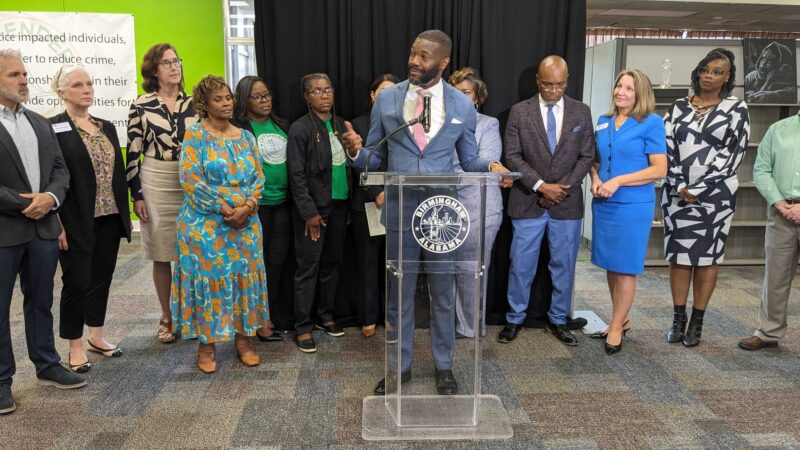Nature Deficit Disorder
On a sunny Saturday morning, in a meadow at the edge of the woods, this group of kids is shooting bottle rockets…under adult supervision, of course.
“Wow!” “There it goes! Good job!” (squeals and laughter…)
If they don’t exactly sound like bottle rockets, that’s because you might say they’re the ‘organic’ kind. For one thing, they’re actual bottles…as in, the two-liter plastic variety…and they’re propelled high into the air from tubs of water, by kids who are getting a physical workout using bicycle pumps to supply the pressure. Volunteer Marty Schulman, a naturalist at Ruffner Mountain, explains the physics aspects of the bottle’s trajectory,
“The biggest variable is the angle of the bottle. The arc. You can do a high arc, and land short. The ideal trajectory is probably an exact 45 degrees, okay?”
Before the day is over, the kids will also try their hand at making jewelry from recycled objects, making bird-feeders from bark and peanut butter, creating old-fashioned daisy-chains, hiking in the woods, and having mock battles with long sword-like plantain leaves. Today’s outing is sponsored by a new group called Fresh Air Family. The group’s organizer, Birmingham journalist and naturalist Verna Gates, says it’s the first of its kind in the United States.
“I see all these things happening in education, where science interest is going down. As a friend of mine describes it, we have this ‘No Teacher Left Standing’ program, where so many field trips are getting canceled. And I see my nephews hooked on video games in front of a television set, and I started to get concerned that we’re not getting children out playing in nature. I mean, science begins when you pick up a rock and look under it, and say, ‘What’s that?’ And I thought, what a fun thing to do, to start a program where families can just go out and be together and do the most wholesome thing in the world.”
Apparently there’s a lot more at stake than science grades, as American children spend more time indoors and become increasingly cut off from the natural world. A number of recent studies show that their physical and mental health is suffering, too, as obesity rates skyrocket, along with the incidence of depression and Attention Deficit Disorder. In fact, an author and child advocate named Richard Louv has given this new problem a name: ‘Nature Deficit Disorder.’ In his influential recent book, ‘The Last Child in the Woods,’ Louv acknowledges that the term ‘Nature Deficit Disorder’ isn’t in the Diagnostic and Statistical Manual quite yet…but he thinks someday it might be.
“He signed my book, ‘To Audrey Ann…thank you for your sacred work, Richard Louv.’ And this is a really, really valuable thing to me.”
Volunteer Audrey Ann Wilson, education director for the Birmingham Botanical Gardens, attended a seminar by Louv this past summer in St. Louis, and she found his message very persuasive.
“Kids are just not as connected as we were. They don’t build tree houses. They don’t go and block up little streams to make dams. We had a nice vacant lot next to our house, and I used to go in there and make little pretend fairy houses for the frogs. And that was developing creativity. Today, with our ‘wired’ generation, they don’t have that opportunity. Too much television, too many computers, and that’s not good for developing minds.”
Verna Gates says she’s already seen children with attention deficits make breakthroughs, on some of Fresh Air Family’s field trips this year.
“We had one boy who’s about nine years old. He’s such an active, hyper child. At Oak Mountain, he ran down and he ran back up. And I was [makes panting sound], but it was like a new world for him. It calmed him down, in a way his mother said she just hadn’t seen before.
National research has discovered that if people are associated with plants, there’s healing going on, whether it’s physical or emotional. Audrey Ann Wilson…
“If you put someone in a hospital room and they have a view of plants or nature, they heal much faster than people who have a view of a brick wall.”
Wilson says she’s also seen, first-hand, that exploring nature can make a difference in children’s lives.
“I taught in Vestavia for 20 years, and I took children on a field experience for a week each fall to the Great Smoky Mountains National Park. A lot of these were suburban kids, who hadn’t really been out in nature, and they’ve come back and said, ‘I’m going to go into environmental law,’ or ‘I’m going to work as a naturalist.’ And that’s really touched me, to see how it affects kids.”
As the plans for Fresh Air Family came together, Gates decided that the best way to make sure the group filled the needs of kids was to bring them into the decision-making process for each outing. As a result, two-thirds of her board of directors are children…such as nine-year-old Maya Webster, of Leeds.
“I’m very excited about going to see the butterfly museum. It’s amazing how one little caterpillar can turn into a butterfly. They start out very dull, and they just come out beautiful. It makes you open your mouth and say, ‘Wow!’ It’s so cool. And it’s a lesson to learn, and to comprehend that you should take care of the earth, and the earth will take care of you.”
At a gazebo just downhill from where the bottle rockets are being launched, a craft class has just finished up, and it’s time for the make-believe ‘swordfights’ with plantain leaves to begin.
Fresh Air Family is already planning its schedule of field trips for 2007, Gates says, and the destinations range from Lake Guntersville, where families will watch bald eagles nesting with their chicks, to the Dismals Canyon, near Florence, the habitat of a rare glow-in-the-dark worm that’s found only a few places on earth outside New Zealand. But according to Gates, all the destinations have one thing in common.
“On a trail, everyone’s equal. You’re all going to one place and coming back, and nobody knows where you started from or what kind of car you drove to get there. You’re all going toward this mutual goal. We have to remember, we came from earth and we go back to earth. If we don’t pass along the care of nature, and the stewardship of it, then we’re not going to last very long.”
Gambling bill in doubt with three days left in the legislative session
Alabama lawmakers are coming down to the finish line for this year’s legislative session. Many bills await passage, but perhaps the biggest one up in the air is a lottery and gambling bill.
Pro-Palestinian demonstration draws counter-protest at University of Alabama
Students gathered demanding the school call for a permanent and immediate ceasefire and to push the school to sever ties with defense contractor Lockheed Martin.
A new Statehouse and related projects will cost about $400 million
The Alabama Legislative Council, a 20-member panel comprised of legislative leaders and their appointees, approved the construction of the new Statehouse last year. The panel was given an update on the project on Wednesday.
New pilot program will offer housing, resources to people leaving prison
The Birmingham Reentry Alliance will provide wrap around services to dozens of men and women adjusting to life after prison.
Alabama committee advances ban on LGBTQ+ pride flags in classrooms
The Senate Education Policy Committee voted 5-2 for the House-passed bill, putting the proposal in line for a possible final passage in the last four days of the legislative session.
A New Orleans garden paid hundreds of dollars in fees for a sewer that doesn’t exist
Galvez Garden owner Lissie Stewart has been fighting the New Orleans Sewerage and Water Board over inaccurate billing for years.







